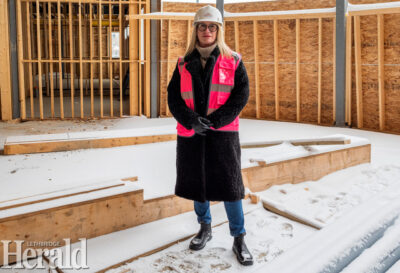Local housing official co-chairs new homelessness panel
By Toyin Obatusin - Lethbridge Herald Local Journalism Initiative Reporter on December 21, 2024.
 Herald file photo by Toyin Obatusin
Robin James stands at the construction site of Lethbridge Housing Authority's 30-unit Supportive Housing Building last month.
Herald file photo by Toyin Obatusin
Robin James stands at the construction site of Lethbridge Housing Authority's 30-unit Supportive Housing Building last month.The provincial government plans to shift the way it deals with homelessness issues going forward, and a city woman will be helping to lead the way.
 Robin James, chief administrator for the Lethbridge Housing Authority, has been named co-chair of a newly formed advisory panel, along with Justin Wright, UCP MLA for Cypress-Medicine Hat. The panel will be responsible for gathering and analyzing data on homelessness and the many issues connected to it throughout Alberta.
 Jason Nixon, Alberta minister of Seniors, Community and Social Services, announced the formation of the panel during a news conference Friday. He also outlined a number of upcoming changes in the way the province tackles homelessness and the related opioid crisis.
 “I think we need to recognize that we have learned from the past and that we need to take into account our successes and our failures as we look to the future,” said Nixon, referring to the work done by the Community Response to Homelessness task force struck a few years ago.
 That group identified a number of improvements that needed to be made to the system, including modernizing shelters, sharing data across different agencies and involving the newly created Recovery Alberta arm of Alberta Health.
 In southern Alberta, the LHA provides supports to some 2,000 people in the city and surrounding areas. James said she sees the value of providing “wraparound” services for people facing homelessness and praised the government for creating the new panel.
 “The impact of these services are life-changing,” said James. “Through (LHA’s) work, we have seen the impact of provincial investments in shelter, housing and housing supports that have been made in our community. We’ve been able to make more programs available to those who need it the most.”
 But she’s also seeing circumstances that have led to more people in the community needing support. More potent street drugs, combined with an increased complexity in dealing with mental health issues, have led to a number of new challenges. And while the previous task force was focused on Alberta’s largest cities, experts are seeing an increase in rural homelessness as well.
 “With these challenges, we see a need for the government of Alberta to take a lead role in assisting Alberta’s most vulnerable,” said James. “Streamlining the grant process for housing programs is the right step forward.”
 To that end, Nixon said there needs to be more province-wide planning and increased oversight and accountability of supports. Part of that is a new policy that will require charities and other groups to apply directly to the government for funding. He was quick to point out the funding has not been reduced, but there will be more oversight in how it’s spent.
 The new advisory panel will provide long-term strategic advice on homelessness beginning in January, with increased focus on Indigenous peoples, rural homelessness, addiction recovery and connection to the broader social services network that serves the homeless.
 James said addiction and mental health issues can easily result in people losing their way in the system that was supposed to be designed to help them. As a result, many fall into homelessness.
 “I think what we have to look at as a panel is how homelessness has become a tertiary system,” said James. “When other systems fail, (homeless supports) has been required to pick up the pieces on that.”
14-13





Great pick for a co-chair! She has shown her dedication to finding solutions to these issues for several years.
There is a serious gap for women who have gone through rehab for 3 months, as there is a lack of available sober housing for them to go to in Lethbridge where they continue their recovery but also get back into society by working. The options are a residence where you must be of Christian belief (and fine if you are) but they also don’t allow their women to attend 12 Step meetings. It’s our way or the highway. Or flop houses where subsidized housing is given, yet some of the clients work full-time but are not continuing their recovery. They should only be allowed to stay up to one year max. Whether people like it or not, they are responsible for their sobriety and they must do what they need to do in order to remain clean and sober and become a good citizen in society. Us taxpayers are really feeling the crunch of inflation and have our own financial struggles. If economy continues as it is, how much will more the taxpayer be expected to support (whether Muni, Prov or Fed)? There’s a difference between enabling and offering a temporary helping hand. Ireland’s gov’t funds a one-time opportunity to help their addicted, if they fail then sorry, they move on and fund the next person who would like to try sobriety. The person is of course allowed to attend rehab again, but at their expense. Like one person said, here they were making a sh_t load of money, yet they were homeless. Rent is not a priority to an addict, their drug of choice is (and it is their only priority).
Perhaps when someone played in a casino, they wondered how it works and casinosnobrasil.com.br has the answer. Here you can find interesting information or little-known information and even strategies to explain what you didn’t know or wanted to know. If you want to choose a really cool online casino, then you are also welcome here.